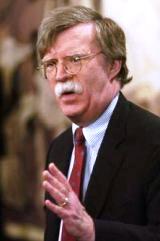US begins quest for approval for UN force for Sudan’s Darfur
Feb 2, 2006 (UNITED NATIONS) — A US-drafted Security Council statement calls for U.N. peacekeepers to be sent to Sudan’s troubled Darfur region and asks United Nations to draw up plans for an eventual takeover from an African Union force.
 The statement, circulated for discussion to Security Council members on Thursday by U.S. Ambassador John Bolton, would be the first step toward authorizing a larger force in Darfur where killings, rape and pillaging continue unabated.
The statement, circulated for discussion to Security Council members on Thursday by U.S. Ambassador John Bolton, would be the first step toward authorizing a larger force in Darfur where killings, rape and pillaging continue unabated.
But the statement, which needs approval from all council members, has not yet received agreement from Qatar, the only Arab nation in the 15-member body and China, a close ally of Khartoum, council envoys said.
Specifically, the Security Council would “support in principal” a transition from the African Union mission in Darfur to a U.N. operation, the draft says. The AU has some 7,000 monitors and soldiers in a region the size of France and chronically suffers from lack of financing.
The draft statement requests U.N. Secretary-General Kofi Annan to “initiate contingency planning without delay” on a range of options and integrate any new operation with the current U.N. peacekeeping mission in southern Sudan.
Final authorization will take at least another month. The African Union has not yet formally agreed to join or turn over it operation to the United Nations. Nor has the Khartoum government given its consent.
The Darfur conflict erupted into violence in early 2003 when African tribes took up arms accusing the Arab-dominated Khartoum government of neglect. The government retaliated by arming Arab militia, known as Janjaweed, who began a campaign of murder, rape, arson and plunder and drove 2 million villagers into squalid camps. Khartoum denies responsibility.
SEVERAL YEARS
In Khartoum on Thursday, the head of the AU mission in Sudan, Baba Gana Kingibe, told reporters any U.N. force should count on being in Darfur for two to three years to help guard refugees returning to villages from squalid camps.
But he said it was inevitable the United Nations would have to take over.
“It is clear in our minds that a transition is inevitable in the long run for the simple reason that it will create a more efficient single peace support operation for the whole of Sudan, bringing coherence and synergy, and integration of political, humanitarian, military and post-conflict issues,” Kingibe said.
Jean-Marie Guehenno, the undersecretary-general for peacekeeping, has started planning but needs a firm decision from the Security Council before recruiting any troops.
No one knows who would join such a force, with Annan hoping Western nations, including the United States and Europeans, would help with an aggressive mobile force and air power.
Bolton’s presidency of the Security Council for the month of February brought calls from advocacy and humanitarian groups for the United States to do something in Darfur following an analysis from the top U.N. envoy in Sudan that international efforts to bring peace to Darfur had failed.
“All we did was picking up the pieces and muddling through, doing too little too late,” Jan Pronk told the Security Council on Jan. 13.
He estimated 20,000 troops would be needed to disarm marauding militias and protect refugees who want to go home, but U.N. officials say this number is too high.
(Reuters)
